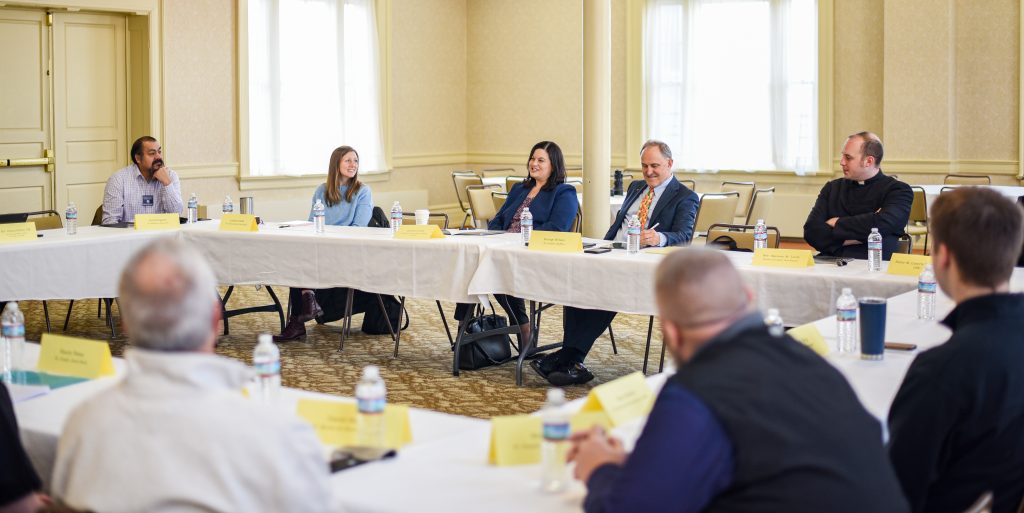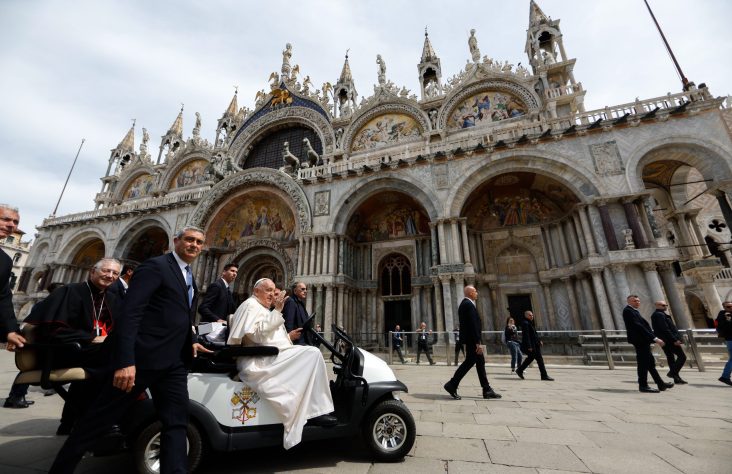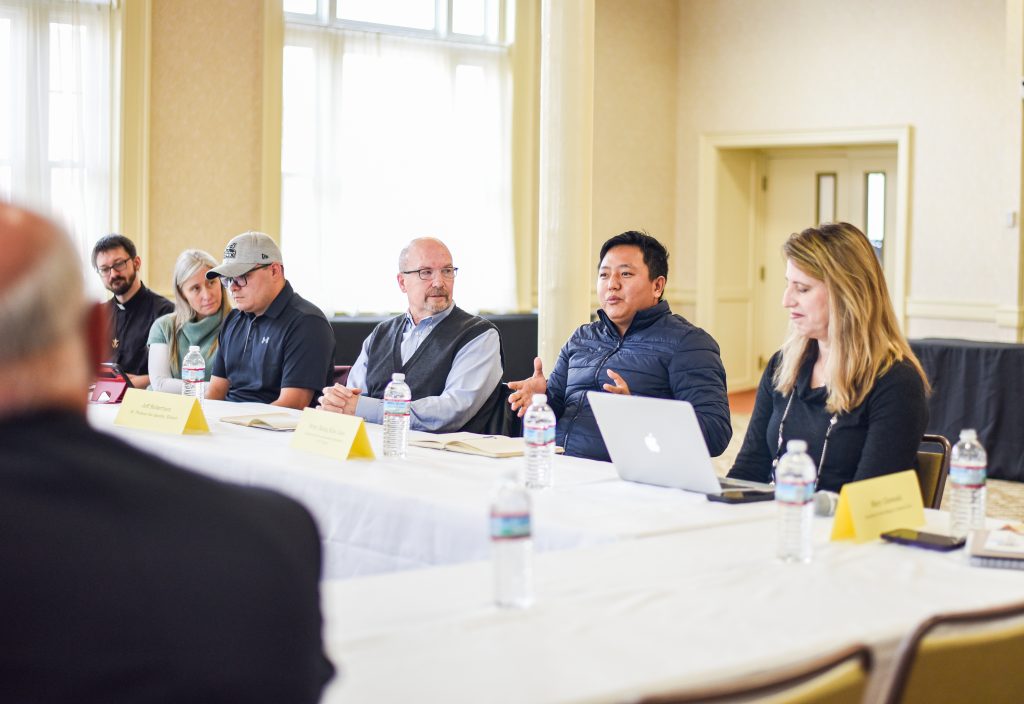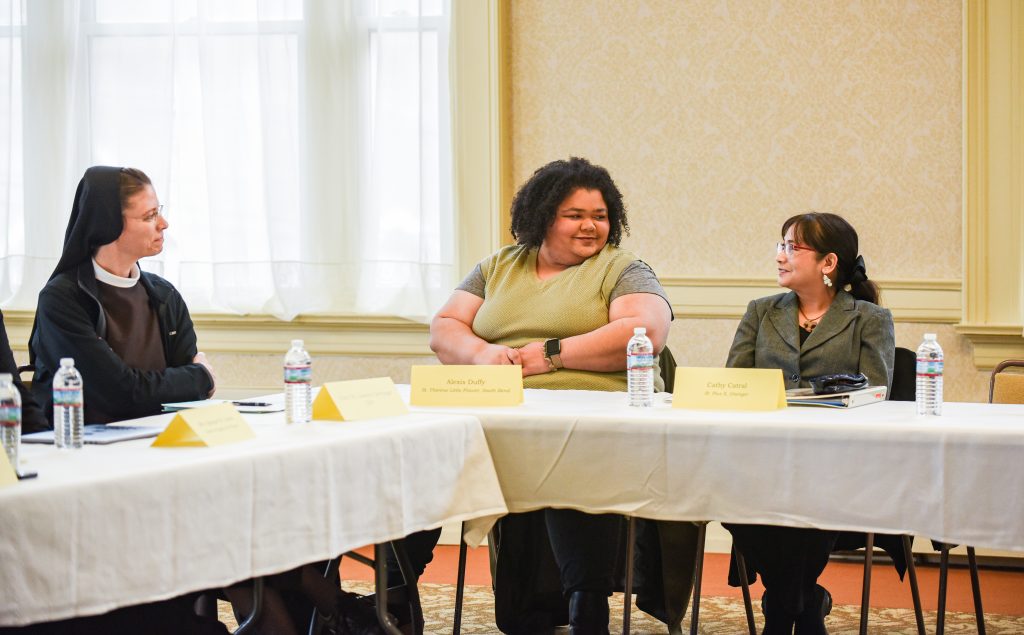February 14, 2024 // Bishop
Bishop Rhoades Forms Diocesan Pastoral Council to Listen, Serve
As members of the newly formed Diocesan Pastoral Council gathered for their first meeting on Saturday, February 10 – the feast day of St. Scholastica – they began by praying with the day’s Office of Readings, which featured a story written by Pope St. Gregory the Great about Scholastica and her brother, St. Benedict.
Given the strict rules of Benedict’s monastery, the two were only able to visit each other once a year. On one such occasion, the saintly siblings “spent the whole day praising God and talking of sacred things.” As the evening wore on, Scholastica begged her brother to stay with her instead of returning to his cell. “Let us go on until morning talking about the delights of the spiritual life,” she said.

Photos by Scott Warden
Members of the newly formed Diocesan Pastoral Council hold their first meeting at Westminster Hall on the campus of Grace College in Winona Lake on Saturday, February 10.
While the Pastoral Council’s time together was certainly more limited, Bishop Rhoades said the reading was fitting for the occasion, “Because it’s about what we will be engaged in today and as we go forward – having meaningful spiritual conversations.”
Bishop Rhoades told the members in attendance at Westminster Hall on the campus of Grace College in Winona Lake that forming a Diocesan Pastoral Council has been a goal of his since he was appointed Bishop of Fort Wayne-South Bend 14 years ago. “It was always on the back burner.” He was inspired to put the plan into action following his participation last October in Rome as a delegate at the Synod of Bishops, which proposed making pastoral councils “obligatory” in all dioceses.
“Based on the understanding of the People of God as the active subject of the mission of evangelization, we suggest legislating for the obligatory nature of pastoral councils in Christian communities and local churches,” according to the synod’s Synthesis Report. “It would also be desirable to strengthen the bodies of participation, with a proper presence of the laity, recognizing the role they can play in discerning decisions by virtue of their baptism.”
“One of the whole ideas of a synod is that all of us are journeying together, walking together,” Bishop Rhoades said as he opened the Pastoral Council’s first meeting. “We’re co-responsible for the mission of the Church – bishop and priests, deacons, religious, laity; we’re all disciples of Jesus, brothers and sisters in Christ, from our baptism, and we walk together. So, the Church has various structures for working together, and especially in pastoral planning and working toward our common mission of evangelization and bringing Christ to the world on every level,” he added.
Bishop Rhoades will preside over the Pastoral Council, with Father Mark Gurtner, Vicar General of the Diocese of Fort Wayne-South Bend, and Mary Glowaski, Victim’s Assistance Coordinator for the diocese, serving as ex-officio members. Joining them on the council are a mix of ordained, consecrated religious, and laity. The members of the Pastoral Council are: Father Spenser St. Louis, Pastor of Queen of Angels Parish in Fort Wayne; Father Osman Ramos, Pastor of St. Anthony of Padua Parish in Angola; Holy Cross Father Cameron Cortens, Parochial Vicar of Christ the King Parish in South Bend; Sister M. Lissetta Gettinger of the Sisters of St. Francis of Perpetual Adoration; Deacon Giovani Munoz, permanent deacon serving St. John the Evangelist Parish in Goshen; Peter Mang Kim Lian, parishioner at the Cathedral of the Immaculate Conception in Fort Wayne; Ryan Norden, parishioner at St. Mary Parish in Avilla; Suzanne Merz, parishioner at St. Joseph – Hessen Cassel Parish in Fort Wayne; Kevin Strater, parishioner at St. Gaspar del Bufalo Parish in Rome City; David Snyder, who attends St. Martin de Porres Parish in Syracuse and Sacred Heart Parish in Warsaw; Leo Patiño, parishioner at Our Lady of Guadalupe in Warsaw; Jeff Robertson, parishioner at St. Thomas Parish in Elkhart; Angeles Gonzalez, parishioner at St. Adalbert Parish in South Bend; Timothy Flanagan, parishioner at Christ the King Parish in South Bend; Nick Sorg, parishioner at St. Pius X Parish in Granger; Ed Rodriguez, parishioner at St. Michael Parish in Plymouth; Laura LaMaster, parishioner at St. Jude Parish in Fort Wayne; Lindsey Arnold, parishioner at St. Vincent de Paul Parish in Fort Wayne; Cathy Catral, parishioner at St. Pius X Parish in Granger; Gretchen Crowe, parishioner at the Cathedral of the Immaculate Conception in Fort Wayne; Julie Wendel, parishioner at St. Robert Bellarmine Parish in North Manchester; Alexis Duffy, parishioner at St. Therese Little Flower Parish in South Bend; George Witwer, parishioner at St. Joseph Parish in Bluffton; and Stacey Noem, parishioner at St. Joseph Parish in South Bend.
Members of the Diocesan Parish Council were recommended by their parish pastors and chosen by Bishop Rhoades in consultation with other leaders of the diocesan Curia. Bishop Rhoades said the body reflects well the geographic and ethnic diversity of the diocese.
The council plans to meet three times per year and will contemplate “what it means to be Christ’s Church on earth,” Bishop Rhoades said, “focusing on our own diocese but keeping in mind our place in the universal Church.” He added: “We really are to look at the big picture. You all come from particular parishes with your own experiences, your own projects. And at this level, that is helpful, but also, we’re looking at the whole. We’re looking at all the parishes, so we are to be concerned about everyone – that means those in our rural parishes, those in inner city parishes, those in the suburbs. We’re looking at the whole picture and our own pastoral vision and mission for the Diocese of Fort Wayne-South Bend.”
Along with Bishop Rhoades setting forth the group’s mission and those in attendance introducing themselves to one another, the first meeting gave members the opportunity to discuss two questions posed by the Synod of Bishops on synodality: “Where have I seen or experienced successes – and distresses – within the Church’s structures, organization, leadership, or life that encourage or hinder the mission?” and “How can the structures and organization of the Church help all the baptized to respond to the call to proclaim the Gospel and to live as a community of love and mercy in Christ?”
In the end, Bishop Rhoades said, the mission of the new Diocesan Pastoral Council is to discern ways in which the Gospel of Christ can be better shared throughout the diocese of Fort Wayne-South Bend. It will begin, he said, by listening. Decisions cannot be made “in a way that’s isolated from the whole People of God,” Bishop Rhoades said. “One cannot be a good pastor if he doesn’t listen to the people. I cannot be a good bishop if it’s all about me. I need to get to know the people and listen to the people.” Doing otherwise, he said “goes counter to what Jesus said. He said, ‘I have come to serve, not to be served.’ … As Bishop, I am the servant of the Church in the Diocese of Fort Wayne-South Bend. … Authority is for service. … The experience of listening and sharing in the light of faith – that’s what this Diocesan Pastoral Council will do.”
The best news. Delivered to your inbox.
Subscribe to our mailing list today.









